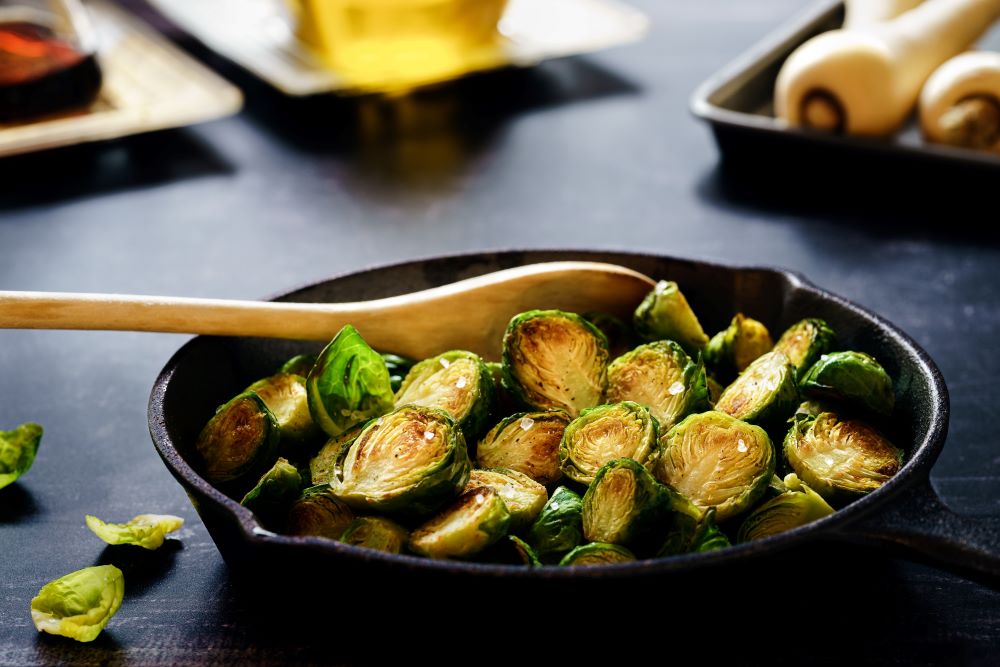
(Unsplash/Sebastian Coman Photography)
Climate change mitigation was not on the minds of Catholic bishops in England and Wales when in September 2011 they reinstated the obligation for Catholics to abstain from eating meat on Fridays year-round (not just during Lent). Rather, they had hoped that reintroducing the communal and visible practice would result in increased religiosity — feelings of connection to the Catholic faith — while simultaneously providing a public witness, said Shaun Larcom, who with Luca Panzone and Po-Wen She conducted the study, "Food for the Soul and the Planet: Measuring the Impact of the Return of Meatless Fridays for (some) UK Catholics," published in October 2022.
A scholar of environmental economics, Larcom wondered if the United Kingdom's relatively small Catholic population would comply with the reinstated rule at a rate that would deliver significant reductions in greenhouse gas emissions associated with the meat industry and that contribute to climate change. And while the scholars found the reinstated obligation's effect on religiosity was "insignificant," its effect on emissions reductions was "non-trivial."
EarthBeat interviewed Larcom about what "Food for the Soul and the Planet" tells us about the potential for religious regulations to impact environmental sustainability goals, especially if adopted on a global scale.
This interview has been edited for length and clarity.
EarthBeat: Historically, why did Catholics abstain from eating meat on Fridays?
Larcom: The tradition seems to date back to the first century, but in the ninth century, the pope sent out a decree in terms of Catholics not eating meat on Fridays. And during the Medieval period, Western Christians, at least in the U.K., also abstained from eating meat on other days of the week as well — Wednesdays and Saturdays and during Advent and Lent and lots of other times. But Friday, I think, has always been special in that it is a form of penance, in memory of Christ's crucifixion, which was on a Friday.
'We've had modern things like "Meatless Mondays" and "Veganuary" coming about, and we're sitting on this ancient tradition within the Catholic Church that could have the same impact.'
—Shaun Larcom
When did Catholics start eating meat on Fridays again?
That was a product of the Second Vatican Council. One of the things that came out of Vatican II was an apostolic constitution that allowed local bishops' conferences to substitute Friday abstinence from meat with some other form of penance. The idea was not to give up Friday penance, but to make it more tailored to the individual. England was one of the last places to allow that tailoring, and one of the first places to bring back the specific obligation to abstain from meat. Though in doing this study, it seems some places never got rid of it at all.
Why did the U.K. bishops reinstate the obligation for Catholics to abstain from eating meat on all Fridays?
They talked about identity and the idea of bringing back a common practice that Catholics could share together. So there was a communal element. But also, there was a view that a lot of Catholics had forgotten we are meant to do something penitential on Fridays. Many saints have talked about a relationship between fasting and abstinence and spirituality. The bishops talked about the idea of an active witness — it's a visible thing, so it's a public witness to the faith. They certainly didn't mention environmental reasons.
Did Catholics in the U.K. comply with the reinstated obligation?
In terms of the behavioral response, the data sources are imperfect, but the survey data shows around a quarter of Catholics in the U.K. responded. It seems a lot of people didn't even know they brought it back, but based on our survey data, around 28 percent of Catholics did change their diets as a result. Around half of those said that they reduced their meat consumption and a bit less said that they eliminated it. There was also a sizable portion who were already not eating meat.

(Unsplash/engin akyurt)
What prompted you to measure the environmental impact of the decision?
The last couple years, there's been a lot of research showing that no or low meat diets make a big impact in terms of climate change — probably not enough to avert climate change, but certainly enough to mitigate it — and they're relatively low-cost options. I do research on environmental economics, so it's something I'm conscious of.
During Lent, we often associate not eating meat with eating fish instead. In America, we even see fast food chains and other restaurants featuring special seafood menu items this time of year. Did the return to meatless Fridays for Catholics in the U.K. have any effects like this?
We didn't find any discernible change in fish consumption. There's been a lot of business activity trying to cater for vegan diets in general, and there are a lot more non-meat substitutes now than there were in the old days when the natural substitute would have been fish.
If you look at where people get most of their protein, those who don't eat meat get around a quarter from fish, so they are substituting in other high protein foods, which, in terms of greenhouse gas emissions and sustainability would probably be a better outcome than switching fully to fish. Substituting meat with non-fish foods would be ideal in terms of the environmental impacts.
Most religions have some sort of dietary proscriptions and it's interesting to think about the resource implications of all of those and whether there's always been a link between resource sustainability in a broader sense and some of these rules, which I hope to look into in the future. It's something pretty much all religions share.
Advertisement
What was the environmental impact of 28 percent of U.K. Catholics abstaining from meat on Fridays? And what is the potential?
We came out with a measure of around 50,000 tons per year of CO2 savings. If you convert that to transatlantic flights, it's around 80,000 transatlantic flights per year. In terms of overall greenhouse gas emissions in the U.K., it's .012 percent. So, it's large and small at the same time.
Catholics make up less than 10 percent of the population in England and Wales. In bigger countries, or countries with bigger Catholic populations, the same obligation could have a much bigger impact. Globally, standard diets vary across different countries, so it's difficult to apply our findings to a worldwide scale.
There are a lot of people of goodwill who want to do something at some level. It's great to see people even talking about it. A similar level of compliance from Catholics in the United States would have a 20 times greater impact in terms of CO2 emissions reductions.








